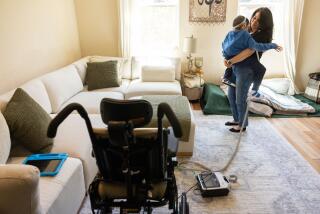Low-Income Seniors in No Rush for Drug Aid
WASHINGTON — Despite a massive outreach campaign, 661,000 of an estimated 4.6 million low-income seniors have been approved for financial assistance so far under the new Medicare prescription benefit, the Social Security Administration said Friday.
That represents 14% of the beneficiaries whom the government estimated would apply and be approved for extra help. The pool of those eligible for the assistance -- which is worth $4,000 a year on average -- is about 8 million.
The figures are another indication that seniors are unsure about the new program, which will offer outpatient prescription coverage through private plans starting Jan. 1. A recent poll by the Kaiser Family Foundation found that about half of low-income seniors realized they would probably be eligible for extra assistance.
“It suggests this program is far too complicated and confusing, when you can’t even give it away,” said Robert Laszewski, a healthcare industry consultant. “It’s terrible that people have a right to assistance with their drug coverage and they don’t know about it, even after months of extraordinary publicity.”
It is unclear whether the government overestimated the number of people who would be eligible or whether potential beneficiaries are simply not aware of the benefit, as is the case with many such government programs.
California has more Medicare beneficiaries than any other state, but about 30,000 Californians have been approved for the aid thus far. Greater numbers of beneficiaries have qualified in other large states, including New York, Texas, Florida and Pennsylvania, according to Social Security figures.
The extra help is available to individual seniors making less than $14,355 a year and married couples with incomes below $19,245. To qualify, individuals can have no more than $10,000 in assets; couples are limited to $20,000. Although seniors must enroll in a drug plan by May 15 or pay higher premiums, there is no deadline to apply for financial assistance.
The nonprofit National Council on the Aging, which is helping to sign up seniors for the prescription benefit and the subsidies, said the figures were a letdown, though not totally unexpected.
“We knew it was going to be a long, hard road to find and enroll the people who are eligible for the extra help,” said James P. Firman, president of the group, which is part of a coalition of dozens of service organizations trying to help. “We will be sitting down with Social Security next week to talk about how the private sector can work more closely with the government to improve on the results.”
Social Security spokesman Mark Lassiter said the agency sent out 19 million applications to seniors it had determined might be eligible, starting in May. It followed up with telephone calls to 9 million households and letters to 5 million more. Under the law that created the Medicare drug benefit, Social Security is charged with administering the subsidies for low-income seniors.
“This is a difficult population to reach,” said Lassiter. “That’s why we are going to continue working hard.... We’re determined.”
The agency said it had received about 3.8 million applications, of which 2.8 million had been processed.
About 400,000 applications were filed in error.
Of the remaining 2.4 million processed, 28% -- 661,162 -- ultimately met both the income and assets limitations, Lassiter said. Most of those who did not qualify -- about 60% -- had too much in assets.
The high rejection rate suggests that even while many who are entitled to the extra help don’t realize it, many other beneficiaries think they might be eligible when they do not qualify.
Many of those who would meet requirements for the aid may be waiting until the prescription drug coverage is actually available, next month.
“Part of the problem is that they are trying to pitch something to seniors before they need it,” said David Lipschutz, a staff attorney with California Health Advocates, which represents the state’s Medicare beneficiaries. “They are kind of putting the cart before the horse. To the extent that people don’t know what [the drug benefit] is, they are not going to want to bother with this extra help.”
The poorest and sickest seniors, including most nursing home residents, will not have to apply for extra help. An estimated 6 million who already have Medicaid -- in California, Medi-Cal -- will be automatically enrolled in the prescription drug benefit. They will have no monthly premiums or annual deductibles, and modest co-payments at the pharmacy.
More to Read
Inside the business of entertainment
The Wide Shot brings you news, analysis and insights on everything from streaming wars to production — and what it all means for the future.
You may occasionally receive promotional content from the Los Angeles Times.










